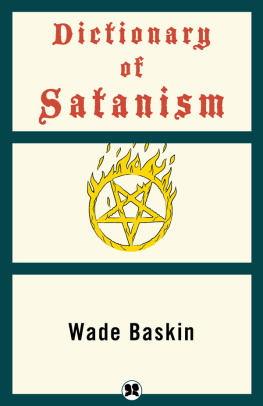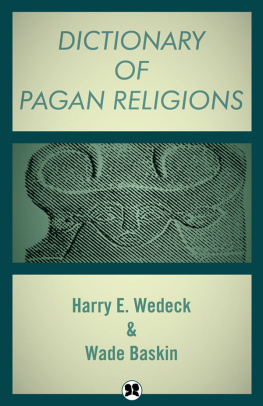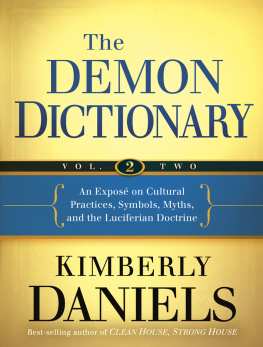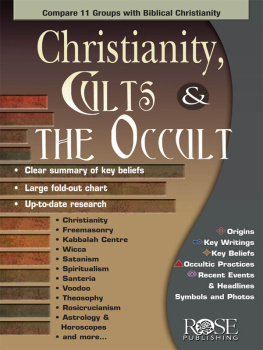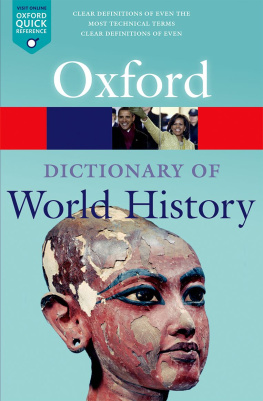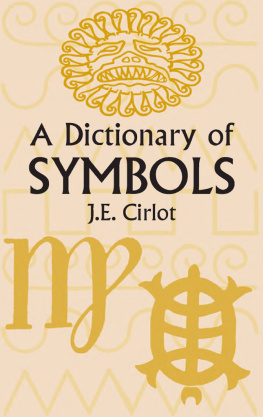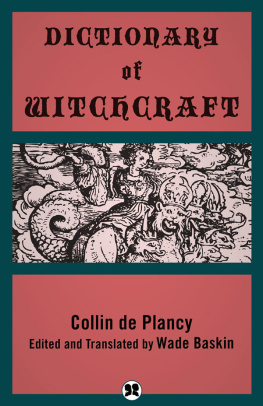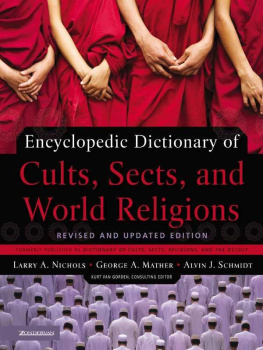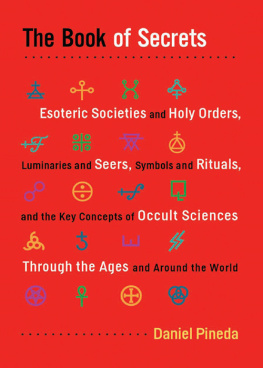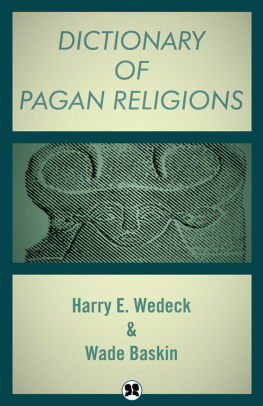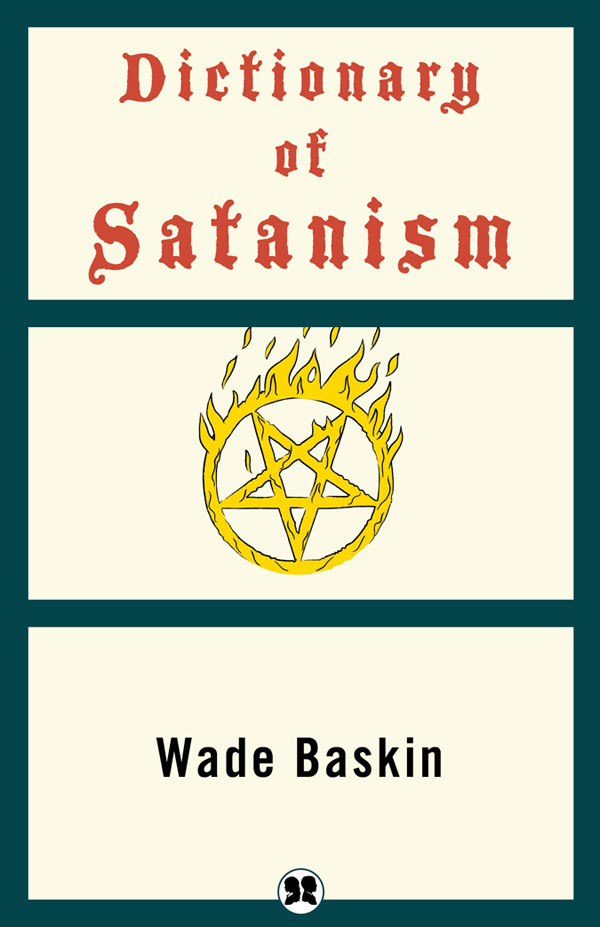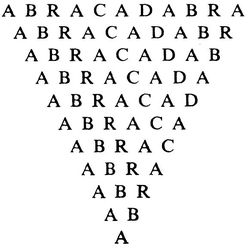A
A..A... Symbol of the secret society founded by Aleister Crowley and known as the Argentinum Astrum.
AAHLA In Egyptian religion, one division of the Amenti, or lower regions.
AAMON One of the three demons in the service of Satanachia, commander of the first legion of Hell.
AARON Byzantine magician reputed to have possessed the Key of Solomon. He is said to have been an adept in the black arts, commanding legions of demons.
AARON One of the earliest sketches of a medieval Jew (1277) is labeled Aaron fil diaboli. Aaron, son of the Devil.
AARONS ROD A magic wand embellished by a serpent. When cast before the Egyptian Pharaoh, it turned into a serpent.
AATS In Egyptian religion, the domain of the dead was divided into fourteen or fifteen divisions, each called an aat and presided over by a different deity.
ABADDON The leader of the demon locusts described in the ninth chapter of the Book of Revelation. This is the Hebrew name of the Angel of the Bottomless Pit. The meaning of the Hebrew word is the destroyer. In Greek he is identified as Apollyon, the name by which he is called in Pilgrims Progress.
ABADIR A title bestowed by the Carthaginians on their principal deities. In the Punic language, the name means mighty father.
ABARIS A priest of Apollo renowned for his prophetic gifts.
ABASTOR One of the horses of Pluto, god of the underworld in classical mythology.
ABATHAKATHI An African enchanter. See Zulus.
ABATUR In Gnosticism, the father of the Demiurgus, the creator of the world. In occult teachings, he is the third Logos.
ABBA AMONA In the Cabala, the occult names of the two higher sephiroth of the upper triad.
ABBEY OF THELEME Society founded in Sicily, in 1920, by Aleister Crowley. The licentious behavior of its members discredited the society.
ABELLION In Celtic mythology, an important deity. He was identified with the Olympian god Apollo.
ABERDEEN WITCHES A witch-hunting craze that swept over Aberdeen following publication of King James Demonology in 1957 resulted in the burning of twenty-four persons.
ABGURVADEL The magic blade of Icelandic wizardry was used in occult operations.
ABHAMSI In mysticism, the four orders of being: gods, demons, pitris, men.
ABIGOR Demon who commands sixty infernal legions. He appears as a handsome cavalier on a winged horse. He knows the future and all the secrets of war.
AB-I-HAYAT In mysticism, the water of immortality.
ABLANATHANALBA In Gnosticism, a term similar to Abracadabra. It reads the same from either end and was used as a charm in Egypt. It may mean Thou art a father to us.
ABRACADABRA A magic word of unknown origin. It is widely supposed to ward off evil, sickness, and death. Quintus Serenus Sammonicus, who accompanied the Emperor Severus to Britain in the year 208, mentions it in a poem as a cure against tertian fever. Dejae mentions it in his Journal of the Plague Year. Eliphas Levi discusses the magic triangle at length and connects it with other occult concepts, including the symbolism of the Taro. For best results, the word should be arranged in the shape of a triangle and worn around the neck. The word is commonly written:
The word is supposed to be a corruption of the sacred Gnostic term Abraxas, a magic formula meaning Hurt me not.
ABRAHAM THE JEW A German Jew who was at once an alchemist, magician, and philosopher. Born in Mayence in 1362, he is supposed to have learned by word of mouth secrets transmitted by the Egyptian occultists, particularly Abramelin.
ABRAMELIN A sorcerer known through Samuel Mathers translation of a manuscript written in French in the eighteenth century but purporting to be a French translation of a Hebrew document, completed in 1458. The central doctrine of The Sacred Magic of Abramelin the Mage is that the cosmos is populated by hosts of angels and demons. The demons work under the direction of the angels. Man stands between the angelic and the demonic forces. To him are attached a guardian angel and a wicked demon. Initiates can control the demons.
ABRASAX In demonology, the word designates a demon with the head of a cock, a huge belly, and a knotted tail. Also, Abraxas.
ABRAXAS A mystic term in vogue among the Gnostics. It can be traced to Basilides of Alexandria, who used it in the second century as a title for the divinity. In Greek numeration, the seven letters of the word denote the number 365, the days of the solar year, representing a cycle of divine action. Moreover, 365 was supposed to be the sum total of the spirits who emanated from God. Occultists believe that the word has magical powers when engraved on stones or gems and worn as a charm.
ABRED In Celtic cosmogony, the force opposing Cythrawl, the power of evil.
ABSTINENCE Ritual magic requires careful preparation. To summon a demon, the magician first prepares himself by abstinence or by some other means which will heighten his powers. Eliphas Levi recommends thorough cleansing before undertaking a magical operation, a minimum of sleep, and abstinence from sex, intoxicating drink, and meat.
ABYDOS The ancient holy city of Osiris, god of the dead. It lies two hundred miles north of Luxor and was the sanctuary of an even older mortuary god before Osiris came to dwell there. Kings delighted to honor the place, and people came from all over Egypt to lay their bones in its sanctified ground, hoping thereby to win greater glory in the next world. The exact location of the tomb of Osiris was known to the devout.
ABYSS In Egyptian religion, a descriptive name for the abode of the dead. In Babylonian thought, it was the primeval chaos from which the universe evolved.
ABZU (ABSU) In Sumerian religion, the watery abyss, abode of the god Enki. In Chaldean mysticism, Absu is the dwelling place of Ab, father of the source of the waters of knowledge.
ACCUSER (THE) One of the names of Satan.
ACERSECOMUS A term denoting the uncut hair on the head of the god Apollo.
ACHELOUS In Greek religion, a river god. The Etruscans used masks of Achelous to protect buildings against the powers of evil.
ACHERON In classical mythology, one of the rivers of Hades. It was called the River of Woe.
ACMON In Greek mythology, a god who existed before the creation of Heaven.
ACONITE A cardiac and respiratory sedative. It is a common ingredient of flying ointment used by medieval witches.
ACRATOPOTES A name applied to Bacchus. In Greek, the expression means a drinker of wine.
ADAD A Babylonian god of wind and storm. Also known as Rammon and, earlier in Palestine and Syria, as Hadad.
ADAMITES In 1925, a group of Adamites were discovered near Oroville, California. Anna Rhodes was the priestess of the cult. She believed that she and her husband were Eve and Adam. They held naked orgies in a farmyard renamed the Garden of Eden.

